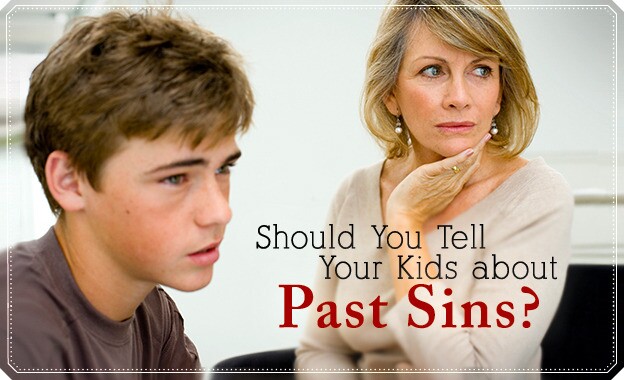
We’ve all done things in our lives that we aren’t proud of. But as kids get older and face increasingly difficult situations, it’s only natural that they’ll want to know how their parents handled similar temptations.
Unfortunately, we can't always tell them we did the right thing--no one is perfect, after all. If your kids haven't asked questions yet, there's a good chance they will someday, so here are a few things to think about before you decide how much you want to share about past sins.
1. Consider the age of the child.
A 6-year-old probably won't be able to comprehend the temptations of physical intimacy or substance abuse. He will, however, understand the desire to lie or to take something that doesn't belong to him. A teenager, on the other hand, will be able to relate to additional struggles.
Regardless of your child's age, you should never ask them to keep what you tell him or her a secret. In an article for the New York Times, author Lawrence Kutner writes, "There's an irony to asking children to maintain a shameful family secret. The request itself perpetuates the shame and encourages the children to feel ashamed of something that is out of their control and, consequently, to feel ashamed of themselves."
2. Consider the severity of the sin.
Most adults feel comfortable sharing a story about how badly they felt after stealing a candy bar from the corner drugstore as a child. But many still carry the guilt from more serious sins, even if they have repented. If you are comfortable sharing more serious sins, be clear in your mind how it would benefit your child before you do so. If there is no immediate benefit, keep it to yourself. If there is a benefit, be sure to only share an appropriate amount of detail.
3. Don’t change the subject or avoid questions.
Even if you aren't comfortable sharing certain mistakes with your children, be sure not to shut down the conversation all together. If you do, your children will learn that there are things they can't talk about with you, and they will be less likely to come to you to discuss difficult topics in the future.
Children respect parents who are honest with them, but as a parent, you have the right to your privacy--and some things are best left between you and the Lord. If you don't want to reopen old wounds, don't feel obligated to do so.
If a child asks you point-blank about something you don't want to share, you can still acknowledge that you have made mistakes that you regret. A statement like, "This is a sensitive subject for me, so I won't go into details, but I want you to know that I wish I had made better choices." Let them know that the standards you are teaching are based on the gospel, and they should be followed in spite of your failure to do so perfectly.
Experts agree that sharing an appropriate amount of information about past mistakes with your children can strengthen the parent-child bond and keep the lines of communication open. It assures children that no one is perfect, and they will be less afraid to come to you when they have made mistakes of their own.
4. Consider your motive for wanting to share.
What benefit is there for sharing past mistakes with your child? If it is to clear your conscience, a child should never be put in that position--that's what your bishop is for.
Do you want your kids to learn lessons from your mistakes? While this is something all parents hope for, be careful how much information you volunteer. A recent study found that children whose parents shared stories of past drinking, smoking, or drug use--even when those stories included regret and emphasized the negative consequences--actually had a higher risk for substance use themselves.
"Knowing that their parents tried substances may actually normalize this behavior for youth and make it seem okay, thereby making youth think their parents wouldn't really disapprove of them using substances," the study's lead author told the Huffington Post.
The authors of the study do not condone parents lying to their children. Just consider carefully how to proceed.
6. Consider how likely your child is to hear about it from another source.When I was a teenager, my friend learned of her mother's infidelity and pending divorce by overhearing adults talking at a family get-together. I can't think of anything more painful than explaining your infidelity to your child, but there might be instances when it is necessary.
Whether it is infidelity, premarital sex, pornography addiction, or something else, if family members, friends, or neighbors know about a serious past sin you have committed, there is a good chance your child will eventually hear about it too. If this is the case, it's probably best your child learns about it from you.
7. Don’t make excuses for your sins.
One of the greatest examples you can set for your children is the example of accountability. Don't blame your parents, friends, or teachers for your bad choices. Explain that everyone has agency to make choices for themselves, but they must also face the consequences of those choices and do their best to learn from their mistakes.
Do you discuss your past sins with your children? Take our poll and tell us how you handle such discussions in the comments below.
